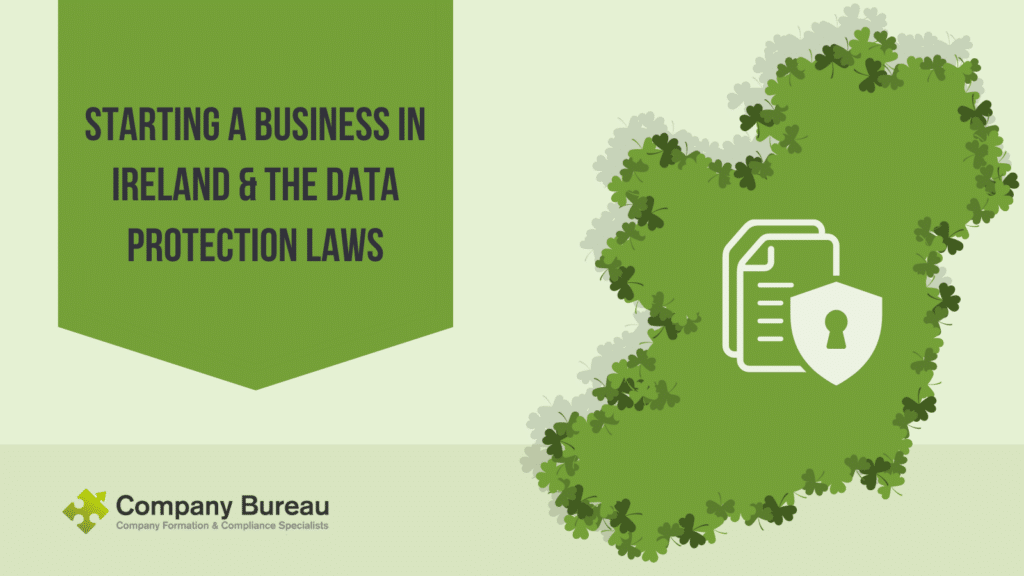Blog
Benefits of Starting a Company in Ireland & the Data Protection Laws
By Shannon Power, 27th January 2023
As a business owner or entrepreneur, the search for the next best opportunity for your business never ends. Ireland has unlimited resources to offer those looking to set up a new business or expand a pre-existing entity. When incorporating a business, it is important to consider all of what a country has to offer your business. However, it is also important to understand the laws in place for these locations and how they may affect how your business operates. This blog will identify the benefits of business incorporation in Ireland and the country’s data protection laws.
Benefits of Starting a Business in Ireland
Ireland was able to achieve an impressive bounce back in its economy after the 2008 financial collapse. As it stands today, Ireland is easily among the best countries to start a new business. One of the most notable benefits of incorporation is its low corporation tax of 12.5%. This has attracted some of the biggest names in tech to its shore. For example, Google, Twitter, and LinkedIn have all decided to establish their European Headquarters here. This element plus the government’s favourable attitude towards business has created a climate that is extremely welcoming to enterprises of all sizes and industries.
The Irish government allocates a significant number of public resources to support entrepreneurs setting up any type of new business. Enterprise Ireland offers multiple funding supports for companies at each development stage and specific funding needs.
With access to numerous ports, Ireland allows for the easy shipment of imports and exports to external markets around the world. Ireland also maintains strong trading deals and arrangements with the US, the UK, Belgium, Germany, France, Spain, and the Netherlands.
The country is backed by a relatively young, well-educated, and skilled workforce across multiple different sectors and industries. Some dominant industries include tourism, pharmaceuticals, high-tech, food and drink, and software. Thanks to these strong industries and continued financial support from the Irish government, Ireland has earned its place as one of Europe’s most attractive countries for business development.
Data Protection Laws in Ireland
The General Data Protection Regulation (GDPR) is a data protection and privacy regulation for all individuals within the EU. Although drafted and passed by the European Union, it imposes its obligation onto all organisation which collects data and targets those within the EU. The regulation was imposed on the 25th of May 2018 and levies harsh fines against those who violate its privacy and security standards.
All companies to which the GDPR applies must have a data collector who decides why and how personal data will be processed. The data collector must demonstrate how the business is GDPR compliant.
Ways to show your company is compliant:
- Designate data protection responsibilities for your team.
- Maintain detailed documentation of the data you’re collecting, how it’s used, where it’s stored, which employee is responsible for it, etc.
- Train your staff and implement technical and organizational security measures.
- Have Data Processing Agreement contracts in place with third parties you contract to process data for you.
- Appoint a Data Protection Officer
The GDPR forms the basis of the Irish Data Protection Laws, known as the Data Protection Act 1998-2018. The legislation confers rights on individuals in relation to the privacy of their personal data as well as the responsibilities of those holding and processing such data.
Among its provisions, the Act:
- Has established a Data Protection Commission as the State’s data protection authority
- It gives further effect to the GDPR in areas where Member States have some flexibility, for example, the digital age of consent.
If would like more information on Data Protection Laws or would like to incorporate a business in Ireland, the team here at Company Bureau are here to help. Contact us today at +353(0)1 6461625 or fill out our online contact form.
Disclaimer This article is for guidance purposes only. It does not constitute legal or professional advice. No liability is accepted by Company Bureau for any action taken or not taken in reliance on the information set out in this article. Professional or legal advice should be obtained before taking or refraining from any action as a result of this article. Any and all information is subject to change.


